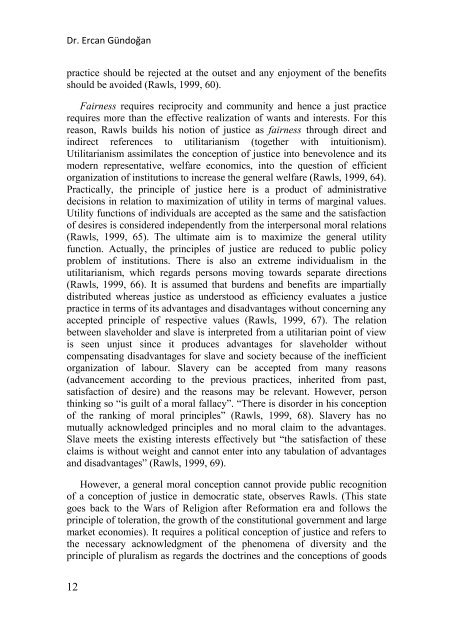SEEU Review vol. 5 Nr. 2 (pdf) - South East European University
SEEU Review vol. 5 Nr. 2 (pdf) - South East European University
SEEU Review vol. 5 Nr. 2 (pdf) - South East European University
You also want an ePaper? Increase the reach of your titles
YUMPU automatically turns print PDFs into web optimized ePapers that Google loves.
Dr. Ercan Gündoğan<br />
practice should be rejected at the outset and any enjoyment of the benefits<br />
should be avoided (Rawls, 1999, 60).<br />
Fairness requires reciprocity and community and hence a just practice<br />
requires more than the effective realization of wants and interests. For this<br />
reason, Rawls builds his notion of justice as fairness through direct and<br />
indirect references to utilitarianism (together with intuitionism).<br />
Utilitarianism assimilates the conception of justice into bene<strong>vol</strong>ence and its<br />
modern representative, welfare economics, into the question of efficient<br />
organization of institutions to increase the general welfare (Rawls, 1999, 64).<br />
Practically, the principle of justice here is a product of administrative<br />
decisions in relation to maximization of utility in terms of marginal values.<br />
Utility functions of individuals are accepted as the same and the satisfaction<br />
of desires is considered independently from the interpersonal moral relations<br />
(Rawls, 1999, 65). The ultimate aim is to maximize the general utility<br />
function. Actually, the principles of justice are reduced to public policy<br />
problem of institutions. There is also an extreme individualism in the<br />
utilitarianism, which regards persons moving towards separate directions<br />
(Rawls, 1999, 66). It is assumed that burdens and benefits are impartially<br />
distributed whereas justice as understood as efficiency evaluates a justice<br />
practice in terms of its advantages and disadvantages without concerning any<br />
accepted principle of respective values (Rawls, 1999, 67). The relation<br />
between slaveholder and slave is interpreted from a utilitarian point of view<br />
is seen unjust since it produces advantages for slaveholder without<br />
compensating disadvantages for slave and society because of the inefficient<br />
organization of labour. Slavery can be accepted from many reasons<br />
(advancement according to the previous practices, inherited from past,<br />
satisfaction of desire) and the reasons may be relevant. However, person<br />
thinking so “is guilt of a moral fallacy”. “There is disorder in his conception<br />
of the ranking of moral principles” (Rawls, 1999, 68). Slavery has no<br />
mutually acknowledged principles and no moral claim to the advantages.<br />
Slave meets the existing interests effectively but “the satisfaction of these<br />
claims is without weight and cannot enter into any tabulation of advantages<br />
and disadvantages” (Rawls, 1999, 69).<br />
However, a general moral conception cannot provide public recognition<br />
of a conception of justice in democratic state, observes Rawls. (This state<br />
goes back to the Wars of Religion after Reformation era and follows the<br />
principle of toleration, the growth of the constitutional government and large<br />
market economies). It requires a political conception of justice and refers to<br />
the necessary acknowledgment of the phenomena of diversity and the<br />
principle of pluralism as regards the doctrines and the conceptions of goods<br />
12

















